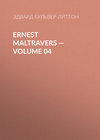Kitobni o'qish: «"My Novel" — Volume 05»
BOOK FIFTH
INITIAL CHAPTER
CONTAINING MR. CAXTON's UNAVAILING CAUTION NOT TO BE DULL
"I hope, Pisistratus," said my father, "that you do not intend to be dull?"
"Heaven forbid, sir! What could make you ask such a question? Intend! No! if I am dull it is from innocence."
"A very long discourse upon knowledge!" said my father; "very long! I should cut it out."
I looked upon my father as a Byzantian sage might have looked on a Vandal. "Cut it out!"
"Stops the action, sir!" said my father, dogmatically.
"Action! But a novel is not a drama."
"No; it is a great deal longer,—twenty times as long, I dare say," replied Mr. Caxton, with a sigh.
"Well, sir, well! I think my Discourse upon Knowledge has much to do with the subject, is vitally essential to the subject; does not stop the action,—only explains and elucidates the action. And I am astonished, sir, that you, a scholar, and a cultivator of knowledge—"
"There, there!" cried my father, deprecatingly. "I yield, I yield! What better could I expect when I set up for a critic? What author ever lived that did not fly into a passion, even with his own father, if his father presumed to say, 'Cut out'!"
MRS. CAXTON.—"My dear Austin, I am sure Pisistratus did not mean to offend you, and I have no doubt he will take your—"
PISISTRATUS (hastily).—"Advice for the future, certainly. I will quicken the action, and—"
"Go on with the Novel," whispered Roland, looking up from his eternal account-book. "We have lost L200 by our barley!"
Therewith I plunged my pen into the ink, and my thoughts into the "Fair Shadowland."
CHAPTER II
"HALT, cried a voice; and not a little surprised was Leonard when the stranger who had accosted him the preceding evening got into the chaise.
"Well," said Richard, "I am not the sort of man you expected, eh? Take time to recover yourself." And with these words Richard drew forth a book from his pocket, threw himself back, and began to read. Leonard stole many a glance at the acute, hardy, handsome face of his companion, and gradually recognized a family likeness to poor John, in whom, despite age and infirmity, the traces of no common share of physical beauty were still evident. And, with that quick link in ideas which mathematical aptitude bestows, the young student at once conjectured that he saw before him his uncle Richard. He had the discretion, however, to leave that gentleman free to choose his own time for introducing himself, and silently revolved the new thoughts produced by the novelty of his situation. Mr. Richard read with notable quickness,—sometimes cutting the leaves of the book with his penknife, sometimes tearing them open with his forefinger, sometimes skipping whole pages altogether. Thus he galloped to the end of the volume, flung it aside, lighted his cigar, and began to talk. He put many questions to Leonard relative to his rearing, and especially to the mode by which he had acquired his education; and Leonard, confirmed in the idea that he was replying to a kinsman, answered frankly.
Richard did not think it strange that Leonard should have acquired so much instruction with so little direct tuition. Richard Avenel himself had been tutor to himself. He had lived too long with our go-ahead brethren who stride the world on the other side the Atlantic with the seven-leagued boots of the Giant-killer, not to have caught their glorious fever for reading. But it was for a reading wholly different from that which was familiar to Leonard. The books he read must be new; to read old books would have seemed to him going back in the world. He fancied that new books necessarily contained new ideas,—a common mistake,—and our lucky adventurer was the man of his day.
Tired with talking, he at length chucked the book he had run through to Leonard, and taking out a pocket-book and pencil, amused himself with calculations on some detail of his business, after which he fell into an absorbed train of thought, part pecuniary, part ambitious.
Leonard found the book interesting: it was one of the numerous works, half-statistic, half-declamatory, relating to the condition of the working classes, which peculiarly distinguish our century, and ought to bind together rich and poor, by proving the grave attention which modern society bestows upon all that can affect the welfare of the last.
"Dull stuff! theory! claptrap!" said Richard, rousing himself from his revery at last; "it can't interest you."
"All books interest me, I think," said Leonard, "and this especially; for it relates to the working class, and I am one of them."
"You were yesterday, but you mayn't be to-morrow," answered Richard, good-humouredly, and patting him on the shoulder. "You see, my lad, that it is the middle class which ought to govern the country. What the book says about the ignorance of country magistrates is very good; but the man writes pretty considerable trash when he wants to regulate the number of hours a free-born boy should work at a factory,—only ten hours a day— pooh! and so lose two hours to the nation! Labour is wealth; and if we could get men to work twenty-four hours a day, we should be just twice as rich. If the march of civilization is to proceed," continued Richard, loftily, "men, and boys too, must not lie a bed doing nothing, all night, sir." Then, with a complacent tone, "We shall get to the twenty-four hours at last; and, by gad, we must, or we sha'n't flog the Europeans as we do now."
On arriving at the inn at which Richard had first made acquaintance with Mr. Dale, the coach by which he had intended to perform the rest of the journey was found to be full. Richard continued to perform the journey in postchaises, not without some grumbling at the expense, and incessant orders to the post-boys to make the best of the way. "Slow country this in spite of all its brag," said he,—"very slow. Time is money—they know that in the States; for why? they are all men of business there. Always slow in a country where a parcel of lazy, idle lords and dukes and baronets seem to think 'time is pleasure.'"
Towards evening the chaise approached the confines of a very large town, and Richard began to grow fidgety. His easy, cavalier air was abandoned. He withdrew his legs from the window, out of which they had been luxuriously dangling, pulled down his waistcoat, buckled more tightly his stock; it was clear that he was resuming the decorous dignity that belongs to state. He was like a monarch who, after travelling happy and incognito, returns to his capital. Leonard divined at once that they were nearing their journey's end.
Humble foot-passengers now looked at the chaise, and touched their hats. Richard returned the salutation with a nod,—a nod less gracious than condescending. The chaise turned rapidly to the left, and stopped before a small lodge, very new, very white, adorned with two Doric columns in stucco, and flanked by a large pair of gates. "Hollo!" cried the post- boy, and cracked his whip.
Two children were playing before the lodge, and some clothes were hanging out to dry on the shrubs and pales round the neat little building.
"Hang those brats! they are actually playing," growled Dick. "As I live, the jade has been washing again! Stop, boy!" During this soliloquy, a good-looking young woman had rushed from the door, slapped the children as, catching sight of the chaise, they ran towards the house, opened the gates, and dropping a courtesy to the ground, seemed to wish that she could drop into it altogether; so frightened and so trembling seemed she to shrink from the wrathful face which the master now put out of the window.
"Did I tell you, or did I not," said Dick, "that I would not have those horrid, disreputable cubs of yours playing just before my lodge gates?"
"Please, sir—"
"Don't answer me. And did I tell you, or did I not, that the next time I saw you making a drying-ground of my lilacs, you should go out, neck and crop—"
"Oh, please, sir—"
"You leave my lodge next Saturday! drive on, boy. The ingratitude and insolence of those common people are disgraceful to human nature," muttered Richard, with an accent of the bitterest misanthropy.
The chaise wheeled along the smoothest and freshest of gravel roads, and through fields of the finest land, in the highest state of cultivation. Rapid as was Leonard's survey, his rural eye detected the signs of a master in the art agronomial. Hitherto he had considered the squire's model farm as the nearest approach to good husbandry he had seen; for Jackeymo's finer skill was developed rather on the minute scale of market-gardening than what can fairly be called husbandry. But the squire's farm was degraded by many old-fashioned notions, and concessions to the whim of the eye, which would not be found in model farms nowadays,—large tangled hedgerows, which, though they constitute one of the beauties most picturesque in old England, make sad deductions from produce; great trees, overshadowing the corn and harbouring the birds; little patches of rough sward left to waste; and angles of woodland running into fields, exposing them to rabbits and blocking out the sun. These and such like blots on a gentleman-farmer's agriculture, common- sense and Giacomo had made clear to the acute comprehension of Leonard. No such faults were perceptible in Richard Avenel's domain. The fields lay in broad divisions, the hedges were clipped and narrowed into their proper destination of mere boundaries. Not a blade of wheat withered under the cold shade of a tree; not a yard of land lay waste; not a weed was to be seen, not a thistle to waft its baleful seed through the air: some young plantations were placed, not where the artist would put them, but just where the farmer wanted a fence from the wind. Was there no beauty in this? Yes, there was beauty of its kind,—beauty at once recognizable to the initiated, beauty of use and profit, beauty that could bear a monstrous high rent. And Leonard uttered a cry of admiration which thrilled through the heart of Richard Avenel.
"This IS farming!" said the villager.
"Well, I guess it is," answered Richard, all his ill-humour vanishing. "You should have seen the land when I bought it. But we new men, as they call us (damn their impertinence!) are the new blood of this country."
Richard Avenel never said anything more true. Long may the new blood circulate through the veins of the mighty giantess; but let the grand heart be the same as it has beat for proud ages.
The chaise now passed through a pretty shrubbery, and the house came into gradual view,—a house with a portico, all the offices carefully thrust out of sight.
The postboy dismounted and rang the bell.
"I almost think they are going to keep me waiting," said Mr. Richard, well-nigh in the very words of Louis XIV. But the fear was not realized,—the door opened; a well-fed servant out of livery presented himself. There was no hearty welcoming smile on his face, but he opened the chaise-door with demure and taciturn respect.
"Where's George? Why does he not come to the door?" asked Richard; descending from the chaise slowly, and leaning on the servant's outstretched arm with as much precaution as if he had had the gout.
Fortunately, George here came into sight, settling himself hastily into his livery coat.
"See to the things, both of you," said Richard, as he paid the postboy.
Leonard stood on the gravel sweep, gazing at the square white house.
"Handsome elevation—classical, I take it, eh?" said Richard, joining him. "But you should see the offices." He then, with familiar kindness, took Leonard by the arm, and drew him within. He showed him the hall, with a carved mahogany stand for hats; he showed him the drawing-room, and pointed out all its beauties; though it was summer, the drawing-room looked cold, as will look rooms newly furnished, with walls newly papered, in houses newly built. The furniture was handsome, and suited to the rank of a rich trader. There was no pretence about it, and therefore no vulgarity, which is more than can be said for the houses of many an Honourable Mrs. Somebody in Mayfair, with rooms twelve feet square, ebokeful of buhl, that would have had its proper place in the Tuileries. Then Richard showed him the library, with mahogany book- cases, and plate glass, and the fashionable authors handsomely bound. Your new men are much better friends to living authors than your old families who live in the country, and at most subscribe to a book-club. Then Richard took him up-stairs, and led him through the bedrooms,—all very clean and comfortable, and with every modern convenience; and pausing in a very pretty single gentleman's chamber, said, "This is your den. And now, can you guess who I am?"
"No one but my uncle Richard could be so kind," answered Leonard.
But the compliment did not flatter Richard. He was extremely disconcerted and disappointed. He had hoped that he should be taken for a lord at least, forgetful of all that he had said in disparagement of lords.
"Fish!" said he at last, biting his lip, "so you don't think that I look like a gentleman? Come, now, speak honestly."
Leonard, wonderingly, saw he had given pain, and with the good breeding which comes instinctively from good nature, replied, "I judge you by your heart, sir, and your likeness to my grandfather,—otherwise I should never have presumed to fancy we could be relations."
"Hum!" answered Richard. "You can just wash your hands, and then come down to dinner; you will hear the gong in ten ininutes. There's the bell,—ring for what you want." With that, he turned on his heel; and descending the stairs, gave a look into the dining-room, and admired the plated salver on the sideboard, and the king's pattern spoons and silver on the table. Then he walked to the looking-glass over the mantelpiece; and, wishing to survey the whole effect of his form, mounted a chair. He was just getting into an attitude which he thought imposing, when the butler entered, and, being London bred, had the discretion to try to escape unseen; but Richard caught sight of him in the looking-glass, and coloured up to the temples.
"Jarvis," said he, mildly, "Jarvis, put me in mind to have these inexpressibles altered."
CHAPTER III
/A propos/ of the inexpressibles, Mr. Richard did not forget to provide his nephew with a much larger wardrobe than could have been thrust into Dr. Riccabocca's knapsack. There was a very good tailor in the town, and the clothes were very well made. And, but for an air more ingenuous, and a cheek that, despite study and night vigils, retained much of the sunburned bloom of the rustic, Leonard Fairfield might now have almost passed, without disparaging comment, by the bow-window at White's. Richard burst into an immoderate fit of laughter when he first saw the watch which the poor Italian had bestowed upon Leonard; but to atone for the laughter, he made him a present of a very pretty substitute, and bade him "lock up his turnip." Leonard was more hurt by the jeer at his old patron's gift than pleased by his uncle's. But Richard Avenel had no conception of sentiment. It was not for many days that Leonard could reconcile himself to his uncle's manner. Not that the peasant could pretend to judge of its mere conventional defects; but there is an ill breeding to which, whatever our rank and nurture, we are almost equally sensitive,—the ill breeding that comes from want of consideration for others. Now, the squire was as homely in his way as Richard Avenel, but the squire's bluntness rarely hurt the feelings; and when it did so, the squire perceived and hastened to repair his blunder. But Mr. Richard, whether kind or cross, was always wounding you in some little delicate fibre,—not from malice, but from the absence of any little delicate fibres of his own. He was really, in many respects, a most excellent man, and certainly a very valuable citizen—; but his merits wanted the fine tints and fluent curves that constitute beauty of character. He was honest, but sharp in his practice, and with a keen eye to his interests. He was just, but as a matter of business. He made no allowances, and did not leave to his justice the large margin of tenderness and mercy. He was generous, but rather from an idea of what was due to himself than with much thought of the pleasure he gave to others; and he even regarded generosity as a capital put out to interest. He expected a great deal of gratitude in return, and, when he obliged a man, considered that he had bought a slave. Every needy voter knew where to come, if he wanted relief or a loan; but woe to him if he had ventured to express hesitation when Mr. Avenel told him how he must vote.
In this town Richard had settled after his return from America, in which country he had enriched himself,—first, by spirit and industry, lastly, by bold speculation and good luck. He invested his fortune in business, —became a partner in a large brewery, soon bought out his associates, and then took a principal share in a flourishing corn-mill. He prospered rapidly,—bought a property of some two or three hundred acres, built a house, and resolved to enjoy himself, and make a figure. He had now become the leading man of the town, and the boast to Audley Egerton that he could return one of the members, perhaps both, was by no means an exaggerated estimate of his power. Nor was his proposition, according to his own views, so unprincipled as it appeared to the statesman. He had taken a great dislike to both the sitting members,—a dislike natural to a sensible man of moderate politics, who had something to lose. For Mr. Slappe, the active member, who was head-over-ears in debt, was one of the furious democrats—rare before the Reform Bill,—and whose opinions were held dangerous even by the mass of a Liberal constituency; while Mr. Sleekie, the gentleman member who laid by L5000 every year from his dividends in the Funds, was one of those men whom Richard justly pronounced to be "humbugs,"—men who curry favour with the extreme party by voting for measures sure not to be carried; while if there was the least probability of coming to a decision that would lower the money market. Mr. Sleekie was seized with a well-timed influenza. Those politicians are common enough now. Propose to march to the Millennium, and they are your men. Ask them to march a quarter of a mile, and they fall to feeling their pockets, and trembling for fear of the footpads. They are never so joyful as when there is no chance of a victory. Did they beat the minister, they would be carried out of the House in a fit.
Richard Avenel—despising both these gentlemen, and not taking kindly to the Whigs since the great Whig leaders were lords—had looked with a friendly eye to the government as it then existed, and especially to Audley Egerton, the enlightened representative of commerce. But in giving Audley and his colleagues the benefit of his influence, through conscience, he thought it all fair and right to have a quid pro quo, and, as he had so frankly confessed, it was his whim to rise up "Sir Richard." For this worthy citizen abused the aristocracy much on the same principle as the fair Olivia depreciated Squire Thornhill,—he had a sneaking affection for what he abused. The society of Screwstown was, like most provincial capitals, composed of two classes,—the commercial and the exclusive. These last dwelt chiefly apart, around the ruins of an old abbey; they affected its antiquity in their pedigrees, and had much of its ruin in their finances. Widows of rural thanes in the neighbourhood, genteel spinsters, officers retired on half-pay, younger sons of rich squires, who had now become old bachelors,—in short, a very respectable, proud, aristocratic set, who thought more of themselves than do all the Gowers and Howards, Courtenays and Seymours, put together. It had early been the ambition of Richard Avenel to be admitted into this sublime coterie; and, strange to say, he had partially succeeded. He was never more happy than when he was asked to their card-parties, and never more unhappy than when he was actually there. Various circumstances combined to raise Mr. Avenel into this elevated society. First, he was unmarried, still very handsome, and in that society there was a large proportion of unwedded females. Secondly, he was the only rich trader in Screwstown who kept a good cook, and professed to give dinners, and the half-pay captains and colonels swallowed the host for the sake of the venison. Thirdly, and principally, all these exclusives abhorred the two sitting members, and "idem nolle idem velle de republica, ea firma amicitia est;" that is, congeniality in politics pieces porcelain and crockery together better than the best diamond cement. The sturdy Richard Avenel, who valued himself on American independence, held these ladies and gentlemen in an awe that was truly Brahminical. Whether it was that, in England, all notions, even of liberty, are mixed up historically, traditionally, socially, with that fine and subtle element of aristocracy which, like the press, is the air we breathe; or whether Richard imagined that he really became magnetically imbued with the virtues of these silver pennies and gold seven-shilling pieces, distinct from the vulgar coinage in popular use, it is hard to say. But the truth must be told,—Richard Avenel was a notable tuft-hunter. He had a great longing to marry out of this society; but he had not yet seen any one sufficiently high-born and high-bred to satisfy his aspirations. In the meanwhile, he had convinced himself that his way would be smooth could he offer to make his ultimate choice "My Lady;" and he felt that it would be a proud hour in his life when he could walk before stiff Colonel Pompley to the sound of "Sir Richard." Still, however disappointed at the ill-success of his bluff diplomacy with Mr. Egerton, and however yet cherishing the most vindictive resentment against that individual, he did not, as many would have done, throw up his political convictions out of personal spite. He reserved his private grudge for some special occasion, and continued still to support the Administration, and to hate one of the ministers.
But, duly to appreciate the value of Richard Avenel, and in just counterpoise to all his foibles, one ought to have seen what he had effected for the town. Well might he boast of "new blood;" he had done as much for the town as he had for his fields. His energy, his quick comprehension of public utility, backed by his wealth and bold, bullying, imperious character, had sped the work of civilization as if with the celerity and force of a steam-engine.
If the town were so well paved and so well lighted, if half-a-dozen squalid lanes had been transformed into a stately street, if half the town no longer depended on tanks for their water, if the poor-rates were reduced one-third, praise to the brisk new blood which Richard Avenel had infused into vestry and corporation. And his example itself was so contagious!
"There was not a plate-glass window in the town when I came into it," said Richard Avenel; "and now look down the High Street!" He took the credit to himself, and justly; for though his own business did not require windows of plate-glass, he had awakened the spirit of enterprise which adorns a whole city.
Mr. Avenel did not present Leonard to his friends for more than a fortnight. He allowed him to wear off his rust. He then gave a grand dinner, at which his nephew was formally introduced, and, to his great wrath and disappointment, never opened his lips. How could he, poor youth, when Miss Clarina Mowbray only talked upon high life, till proud Colonel Pompley went in state through the history of the Siege of Seringapatam?




















